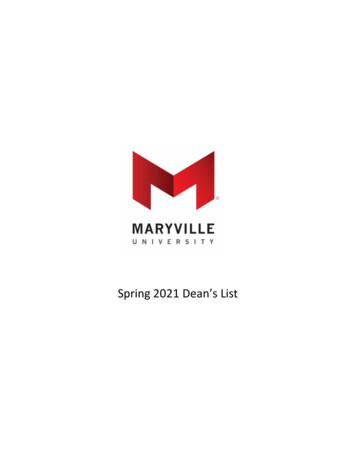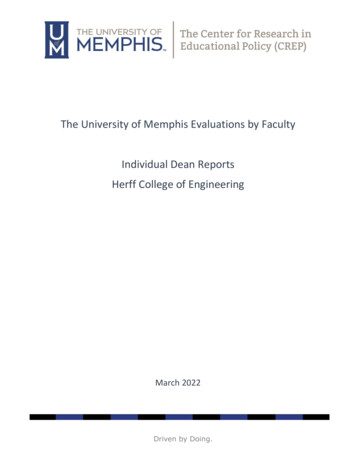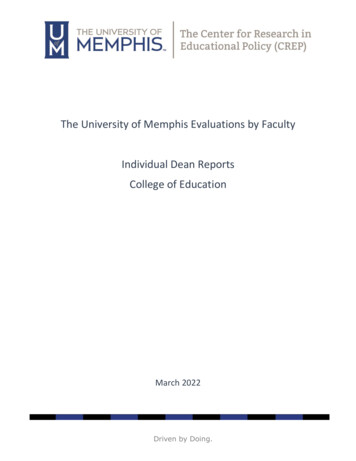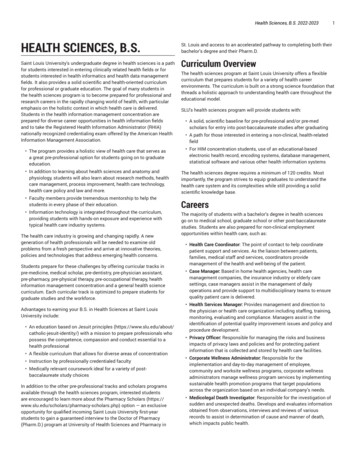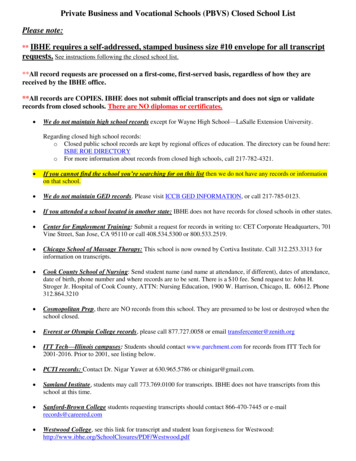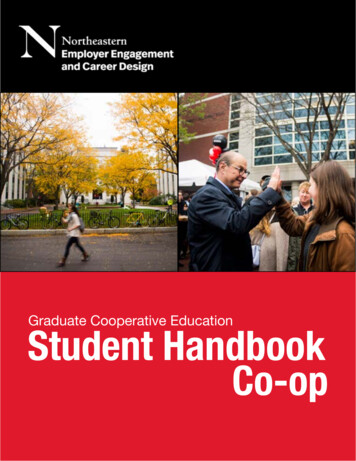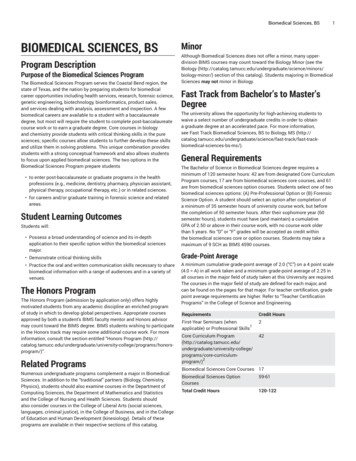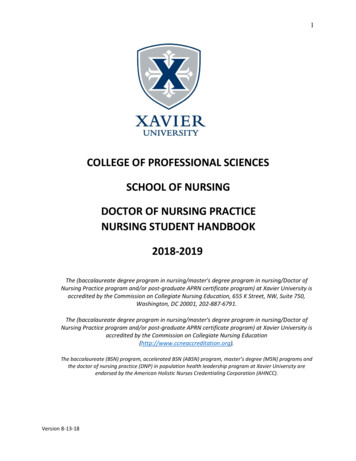
Transcription
1COLLEGE OF PROFESSIONAL SCIENCESSCHOOL OF NURSINGDOCTOR OF NURSING PRACTICENURSING STUDENT HANDBOOK2018-2019The (baccalaureate degree program in nursing/master's degree program in nursing/Doctor ofNursing Practice program and/or post-graduate APRN certificate program) at Xavier University isaccredited by the Commission on Collegiate Nursing Education, 655 K Street, NW, Suite 750,Washington, DC 20001, 202-887-6791.The (baccalaureate degree program in nursing/master's degree program in nursing/Doctor ofNursing Practice program and/or post-graduate APRN certificate program) at Xavier University isaccredited by the Commission on Collegiate Nursing Education(http://www.ccneaccreditation.org).The baccalaureate (BSN) program, accelerated BSN (ABSN) program, master’s degree (MSN) programs andthe doctor of nursing practice (DNP) in population health leadership program at Xavier University areendorsed by the American Holistic Nurses Credentialing Corporation (AHNCC).Version 8-13-18
2Xavier UniversityCollege of Professional SciencesSchool of NursingDoctor of Nursing Practice in Population Health LeadershipStudent HandbookThe Xavier University Doctor of Nursing Practice (DNP) program is an online population healthpost-graduate degree program that prepares nurses as leaders in local, regional, national, orglobal health settings to address the complexity of health care and health care outcomes in the21st century. Through the lens of Jesuit tradition and values, students will build on a previouslyearned master’s degree to achieve the highest level of academic preparation in nursing.The curriculum integrates scientific, philosophical, ethical, and historical perspectives of nursingpractice with a global and holistic perspective of health care delivery. Organizational andsystems leadership, interprofessional collaboration, population–based innovation, evaluation,health policy and advocacy are examined for the improvement of health outcomes in diversepopulations. Intense immersion experiences throughout the curriculum focus on theintegration of knowledge gained. A final DNP scholarly project incorporates the design,implementation, and evaluation of delivery methods to improve the health of the nation.Immersion hours are required as students progress through the program. A total of 1000 hoursare needed for graduation; a portion of which may be fulfilled by prior academic experience oradvanced certification. Given the program concentration on health care in a variety of settings,students choose populations and immersion settings of interest to them. Students who needmore time to complete immersion hours and/or the DNP scholarly project will register for a 1-3credit hour continuation course each semester until degree requirements are met. If more timeis needed to fulfill degree requirements, the student must complete the program within sixyears, or formally apply for an extension.Program PhilosophyJesuit tradition and values, population health, holism, ethics, and interprofessionalcollaboration provide the philosophical basis and guiding principles for this DNP program.Health care reform, the Future of Nursing Report 2010 and its 2015 follow up report, Qualityand Safety Education for Nurses (QSEN), AACN Faculty Think Tank Repot & Recommendations2017, and the Doctor of Nursing Practice (DNP) Essentials (aacnnursing.org) further guide theDNP curriculum. (See Appendix A for Population Health model.)Program Goals1. Integrate the scientific, philosophical, ethical, and historical underpinnings of professionalnursing practice from a global and holistic perspective.Version 8-13-18
32. Provide organizational and systems leadership for quality improvement and systemsthinking.3. Provide leadership in clinical scholarship and analytical methods for the translation ofresearch in evidence-based care.4. Utilize information systems/technology and patient care technology for the holisticimprovement and transformation of health care.5. Influence health care policy by possessing essential skills in policy and advocacy.6. Establish interprofessional collaboration for holistically improving patient and populationhealth outcomes.7. Design, implement, and evaluate health care delivery methods for illness prevention andpopulation health for improving the Nation’s health.8. Utilize conceptual and analytical skills to distinguish relationships among practice,organizations, diverse populations, fiscal resources, and policy concerns and to advancenursing practice.The Doctor of Nursing Practice EssentialsThe DNP Essentials describe the elements of the curriculum and competencies that arerequired in programs awarding the Doctor of Nursing Practice degree. DNP graduates areprepared for a variety of nursing practice roles. The DNP Essentials delineate the competenciesthat are the foundation for all advanced nursing practice roles (Appendix B).(American Association of Colleges of Nursing (AACN), 2006, p. 8)Version 8-13-18
4DNP Program Eight Semester Curriculum SequenceYear 1FallSpringSummerNURS 900DNP Foundations (3)NURS 903Nursing Leadership inComplex Population-BasedHealthcare Systems (4)*NURS 906Informatics for AdvancedNursing Practice in ComplexHealth Systems (3)NURS 904Application of AdvancedResearch Methodologies (3)NURS 902Advanced Evidence BasedPractice (3)NURS 864Epidemiology (3)Year 2FallSpringSummerNURS 905Healthcare Finance andEconomics for Nurse Leaders(4)*NURS 910NURS 911Scholarship of AdvancedAdvanced PracticeApplication and Innovation (3) Application (4)**NURS 908Health Care Policy (3)NURS 907Evaluation and Analysis ofOutcomes in Health Care (4)*Year 3FallNURS 915Immersion and DNPProject I (3) ***SpringSummerNURS 917Immersion and DNPProject II (3) ****1 credit immersion hour 45 contact hours**2 credits immersion hours 90 contact hours*** Immersion hours required for project completionAcademic AdvisingThe DNP Associate Director will serve as the academic advisor for course progression for eachstudent.Version 8-13-18
5DNP Faculty Mentor and Project TeamThe DNP faculty mentor is a doctorally prepared member of the faculty of the school of nursing.Students will have the opportunity to meet the graduate program faculty during their oncampus orientation in the first semester of the program. Students should read faculty bios, andidentify potential mentors who may have similar scholarly interests prior to their on-campusvisit. Students will invite a faculty mentor to serve on their project team through a formalprofessional letter introducing themselves and their prospectus of DNP potential project idea(Appendix C). The student must also submit the letter and prospectus document to DNPProgram Associate Director. The prospectus can be submitted any time after the completion oftheir first year courses (NURS 900, NURS 902, NURS 903, NURS 904), and must be submittedprior to beginning their second year courses (NURS 905, NURS 908). Completion of theinvitation letter and prospectus is an assignment in Module 1 of the NURS 905 HealthcareFinance and Economics for Nurse Leaders course.The DNP project team consists of the student, a doctorally prepared faculty mentor, and atleast one other member with the skills and expertise needed to ensure success of the project.The nature of the student’s proposed work will determine the specific talents required for theproject team, and the student will work with their faculty mentor to identify team members.Letters inviting potential team members should include a statement on how the individual’sexpertise would benefit the proposed project. The DNP Associate Director will provideoversight of all DNP scholarly projects and team members. The maximum number of teammembers whose primary affiliation is outside the university is limited to two. The roles andresponsibilities of the DNP student and the project team faculty and members are outlined inAppendix D.DNP Scholarly ProjectThe final DNP scholarly project demonstrates mastery of the knowledge, competencies, andskills to meet the DNP essentials, and is required for program completion. The student will workunder the guidance of his or her mentor to select a population health related phenomenon ofinterest, problem or issue in which improvements are needed for the DNP project. The DNPproject reference textbook will be used to inform the development and implementation of theproject (Appendix E). The timeline and milestones for completion of the DNP program,including the scholarly project, are included in Appendix F.CandidacyPrior to participating in NURS 915 Immersion and DNP Project I course, the DNP student mustachieve candidacy. The student will write a scholarly project proposal under the guidance oftheir faculty mentor. Candidacy is awarded following satisfactory defense of the scholarlyproject proposal and presentation.Version 8-13-18
6Immersion ExperiencesImmersion experiences provide the student with opportunities to engage in a practiceenvironment to witness, understand, apply and reflect on specific aspects of the DNPessentials. In partnership with the course faculty, students select and are precepted by anursing or interprofessional leader during their immersions. Goals are established for theimmersion experience by the student and shared with the preceptor. The preceptor andstudent identify the activities, events and people during the immersion that will assist inmeeting these goals.Students are required to have 1000 hours of immersion to complete the DNP degree.Students will fulfill immersion hours by: Receiving credit (up to 500 hours) for Master’s level immersion hours. The DNPAssociate Director will determine the number of hours credited based on areview of the student’s transcript and any hours submitted by the student. Eachstudent will receive written confirmation of their number of credited immersionhours during the first semester of the DNP program. Students may request additional credit for up to the 500 hours of the 1000 hoursfor an advanced nursing certification that requires a Master’s degree. To receivethis credit, the student needs to complete the form in Appendix G. If thestudent has an advanced nursing certification when beginning the program, thecompleted form and documents from the accrediting body that verify theircertification should be submitted to the Associate Director of the DNP programduring fall semester of Year 1. If a student earns an advanced nursingcertification during the DNP program, the form and supporting documentsshould be submitted to the Associate Director of the DNP program when thecertification is awarded, and no later than 30 days prior to beginning NURS 915Immersion and DNP Project I. Students who want to achieve the 500 hours credit toward 1000 requiredimmersion hours, but do not have an advanced certification, can do so byworking with their faculty mentor to identify additional immersion experiencesthat align with meeting the DNP Essentials or the objectives of their DNP project.The student must submit the proposal for the additional credited immersionhours experience described in Appendix H to their faculty mentor for approvalprior to the additional immersion experience. At the conclusion of thisexperience, the student must complete and submit the documents described inAppendix I to the faculty mentor and DNP Associate Director for final approvalof the actual additional hours that will be credited toward the 1000 requiredhours. The NURS 903, 905, 907, 911 courses include immersion hours totaling 225hours. Students will work with the course faculty to select a preceptor at theimmersion site, and complete the required immersion documents.Version 8-13-18
7 Additional credited immersion hours can be accumulated during the springsemester of the first year of the program during the 903 course, and during thesemesters when enrolled in the 905, 907 and 911 courses during the DNPprogram with the approval of the course instructor. The additional creditedimmersion hours are above the required course immersion hours in NURS 903,NURS 905, NURS 907, and NURS 911. These additional credited hours will bedocumented in the immersion journal for the course. A student cannot receivemore than a total of 500 credited immersion hours during the DNP program,which include any credited hours from their MSN program and advanced nursingcertification.NURS 915 and 917 are immersion courses. Students will work with their facultymentor to determine the location and preceptor/practice mentor for the finalimmersion experience. Following the completion of the NURS 911 AdvancedPractice Application course, the DNP Associate Director will provide each studentwith the number of hours credited toward prior to the final DNP projectimmersion experience, and determine the hours needed to fulfill the total 1000immersion hours.Drug Screening and Background ChecksMany of the programs in the College of Professional Sciences require BCI/FBI criminalbackground checks and/or drug screens because of university program, accreditation, clinical,immersion, and/or professional mandates. Requirements vary from program toprogram. Failure to satisfy the requirements can result in dismissal from the program,withdrawal from field, clinical or immersion placements, delayed program progression, ordiminished employment opportunities. All students attending an immersion or clinical site musthave an annual ten panel drug screen and BCI fingerprinting and background check prior toentering the immersion or clinical setting. See the Castle Branch website for instructions oncompletion. A student who is deemed to have a positive urine drug screen may not participatein any immersion or clinical experience. Failure to complete the immersion or clinical siterequirements in a timely manner may result in unsuccessful completion of the program and/ordisciplinary action at the department level.If you have questions or need further information, please contact Susan Allen, DNP ProgramAssociate Director, in the School of Nursing at allens14@xavier.edu.Progression during the Program of StudyIf a student wishes to complete the DNP program in eight semesters, the student will completethe coursework by following the two course per semester sequence during the first fivesemesters of the program (page 4). Students who wish to move through the program at aslower pace will work with the DNP Associate Director to determine their course progression.Version 8-13-18
8Courses with prerequisites must be completed in the required order. DNP foundational courses(900, 902, 903, 904, 905, 906, 907, 908, & 910) must be completed prior to the DNP projectimmersion courses (911, 915 & 917).Students must maintain a minimum of a 3.0 GPA to achieve satisfactory progress throughoutthe curriculum. One “C” grade is allowed providing the GPA remains at 3.0 or higher. A second“C” grade will lead to program dismissal. The admission, progression, and graduation (APG)committee can be petitioned for readmission approval.Incomplete Grades in CoursesFaculty may assign an incomplete grade if the student requests this option, and the facultymember approves this request. The student’s request for a grade of M (incomplete) must besubmitted in writing. The student must be certain to read the information in the XU UniversityCatalog to examine options and responsibilities in accepting and removing the incompletegrade. Grades of "M" (Graduate Incomplete) should be cleared within four weeks after the lastday of the term in which the course was taken. This time limit may be extended but may notexceed a period of one year from the end of the term.http://catalog.xavier.edu/content.php?catoid 25&navoid 1395#Graduate Grading SystemA grade of F will be given if the student does not communicate the desire to take an incompleteto the course instructor prior to the end of the semester in which enrolled. For nursing coursesthat are prerequisites for another course, an incomplete grade will prevent the student fromregistering for that course.Students who receive a grade of “M” in NURS 911, 915, or 917 will register for NURS 918 at oneto three credit per semester to allow continuous enrollment and faculty support for candidacyrequirements, or the completion of the final immersion and DNP Project requirements. Asnoted earlier, students may not register for the regularly scheduled DNP course in a subsequentsemester following the receipt of an “M” grade until the “M” grade is resolved.If the student is deferred for graduation due to a grade of incomplete, he or she may be eligiblefor the original date of graduation. Work must be completed, graded and recorded withinthirty calendar days of that term's graduation date.Version 8-13-18
9Appendix AVersion 8-13-18
10Appendix BThe Essentials of Doctoral Education for Advanced Nursing PracticeI.II.III.IV.V.VI.VII.VIII.Scientific Underpinnings for PracticeOrganizational and Systems Leadership for Quality Improvement and SystemsThinkingClinical Scholarship and Analytical Methods for Evidence-Based PracticeInformation Systems/Technology and Patient Care Technology for the Improvementand Transformation of Health CareHealth Care Policy for Advocacy in Health CareInterprofessional Collaboration for Improving Patient and Population HealthOutcomesClinical Prevention and Population Health for Improving the Nation’s HealthAdvanced Nursing Practice(American Association of Colleges of Nursing (AACN), 2006, p. 8-17)Version 8-13-18
11Appendix CDNP Project Prospectus FormatThe following format is to guide you in developing a prospectus for your DNP scholarly project.The prospectus (one to three single-spaced pages) serves as a starting point for discussionsbetween you and your faculty mentor. It forms a basis for the scope and content of the project.The prospectus is due after completion of the 900, 902, 903 and 904 courses. It must besubmitted by the end of Module 1 in the NURS 905 Healthcare Finance and Economics for NurseLeaders. The prospectus must should follow the format below. Description of the problem/issue/phenomenon of interest (including a definition of thespecific population within your community) Current literature supporting the need for the project (include a reference page in APAformat) Purpose of the DNP project Significance for organization (include any targeted measurable clinical /populationoutcomes, financial outcomes, and any ACA/PCMH/other mandates that are significantto your project). Significance for Population Health (refer to model) Significance for major stakeholders including nursing and community partners relatedto population selectedVersion 8-13-18
12Appendix DDNP Project Team Membership and Responsibilities GuidelinesDNP Project Team membership includes:a. DNP Project Faculty Mentorb. Practice mentor from the community where the project will be implementedc. Additional interprofessional team members as needed; one member may be fromoutside the university.d. Two team members must have doctoral degreesAdditional project resource:e. DNP Program Associate DirectorThe responsibilities of project team members and student are outline below.DNP Project Faculty Mentor Provides primary guidance and feedback to the student throughout development of theproject proposal, including team formation and candidacy. Guides the student in completing a Team Charter in NURS 911 that includes thedescription of interprofessional team member roles. (Examples include content expert,statistician, and/or QI consultant) Determines readiness for candidacy Provides primary guidance and feedback to the student through project completion inconsultation with project team Sets aside time for office hour appointments with student each semester Works with DNP Program Associate Director to assure necessary site agreements are inplace prior to student immersion experiencesDNP Project Practice Mentor (may be the preceptor or another individual in the fieldexperience) Provides feedback on the feasibility of the project proposal for the practice setting Guides student during the implementation phase of the project plan Participates in the evaluation of student performance in the field experienceInterprofessional Team Members Roles for additional team members are defined according to the expertise of theindividual. The student will work in consultation with his or her Project Mentor tocomplete a Team Charter that includes a description of interprofessional team memberroles. (Examples include content expert, statistician, and/or QI consultant) All project team members are invited to participate in the student’s candidacy meetingVersion 8-13-18
13Student Responsibilities Selects site for immersion in consultation with Project Mentor Invites Project Mentor, Preceptor, Practice Mentor (if other than preceptor), andinterprofessional team to serve on project team Completes and submits required documentation for immersion site experiences Develops project proposal in consultation with Project Mentor and other teammembers, as directed by the Project Mentor Requests candidacy meeting after approval is granted from the Project Mentor Leads project meetings with team members in the field Has at least two project team meetings with all members Completes all course assignmentsVersion 8-13-18
14Appendix EDNP Project Reference TextbookThe DNP project reference textbook is:Reavy, K. (2016). Inquiry and leadership: A resource for the DNP project. Philadelphia, PA: F. A.Davis Company.This is a required textbook for all students in the DNP program, and will be used in coursesthroughout the program. This textbook explains what a DNP scholarly project is, and how it isdifferent than a research-focused PhD study. It will serve as a resource for the scholarly practiceproject when: identifying its focus forming a project team appraising and synthesizing the evidence in the literature to support the project choosing a framework implementing and managing the project considering methods of analysis and evaluation writing the project proposal disseminating the project findingsCourses throughout the DNP program will provide specific information to deepen the student’sunderstanding of each of the above content areas, as well as develop and support the student’sability to successfully complete the project and program.Version 8-13-18
15Appendix FDNP Program MilestonesMilestoneOn CampusOrientation meeting (2-days)Prospectus approvalFaculty mentor confirmed(begin proposal writing)Team Charter signed by all teammembers (NURS 911)Faculty mentor approval of proposalconfirming readiness for candidacyCandidacy defenseProposal approvalIRB approval (NURS 915)Completion of project deliverable(s)Final project approvalApplication for graduation(NURS 917)Completion of required 1000immersion hoursAttendance at Pinning andGraduation Ceremonies (optional)XVersion 8-13-18XXComplete(check this column when milestone iscompleted)
16Appendix GDoctor of Nursing Practice in Population Health Leadership ProgramDocumentation of Advanced CertificationStudent Name1. Provide official documentation of the advanced certification.2. Provide documentation of the requirements for the advanced certification (i.e. clinicalhours, other requirements).Hours granted for advanced certification toward DNP 1000 immersion hoursApproved By:Associate Director, Doctor of Nursing Practice Program, School of NursingDate:Version 8-13-18
17Appendix HDNP Project Faculty Mentor Approved Additional Credited Immersion HoursThe purpose of this document is to provide a template to request additional creditedimmersion hours prior to NURS 915 for DNP students who have fewer than 500 immersionhours from their master’s program credited toward 1000 DNP immersion hours. Students whohave been credited with less than 500 master’s credited practicum hours or advanced nursingcertification may propose experiences that allow them to achieve up to a total of 500immersion hours prior to NURS 915 immersion course. A one-page proposed immersionexperience will be submitted to the DNP Project Faculty Mentor for approval two calendarweeks prior to the experience. Only proposals for 45 hours or above will be considered.1. The proposal defining the immersion experience will include:i. Immersion site, preceptor’s name and preceptor qualifications (attach CVor resume)ii. Learning objectives for immersioniii. DNP essentials that will be met during the immersioniv. Activities: experiences also could include but are not limited toconference attendance, community meetings, shadowing in sites that areexternal to the primary site of the immersion experience, identifying andconsulting with experts in the topic area, coordinating potentialimmersion experiences in multiple sites, or assuring strong connections inthe primary site, to determine data collection sites, etc.v. Number of immersion hours to be accomplished during specificexperiences.Version 8-13-18
18Appendix IFaculty Mentor Supervised Independent Immersion Hours Experience ReportProvide documentation that includes the following:1. Completed DNP Immersion Hours Immersion Journal Spreadsheet with documentation ofImmersion hours including the date, number of hours, DNP essential(s) met, immersion learningactivity, and student reflection2. Description of how each immersion experience objective was met3. Summary of and reflections about overall immersion experienceStudent Signature:Date:Faculty Mentor Approval and Signature: Date:DNP Associate Director Approval and Signature: Date:Version 8-13-18
19ReferencesAmerican Association of Colleges of Nursing. (2006). The essentials of doctoral education foradvanced nursing practice. Washington, DC: American Association of Colleges of NursingAmerican Association of Colleges of Nursing. (2015). The doctor of nursing practice: Currentissues and clarifying recommendations. Washington, DC: American Association ofColleges of NursingAmerican Association of College of Nursing. (2017). AACN Faculty Think Tank Report &Recommendations. PTT-Report10-12-2017.pdfVersion 8-13-18
COLLEGE OF PROFESSIONAL SCIENCES . SCHOOL OF NURSING . DOCTOR OF NURSING PRACTICE . NURSING STUDENT HANDBOOK . 2018-2019 . The (baccalaureate degree program in nursing/master's degree program in nursing/Doctor of . 21st century. Through the lens of Jesuit tradition and values, students will build on a previously .

